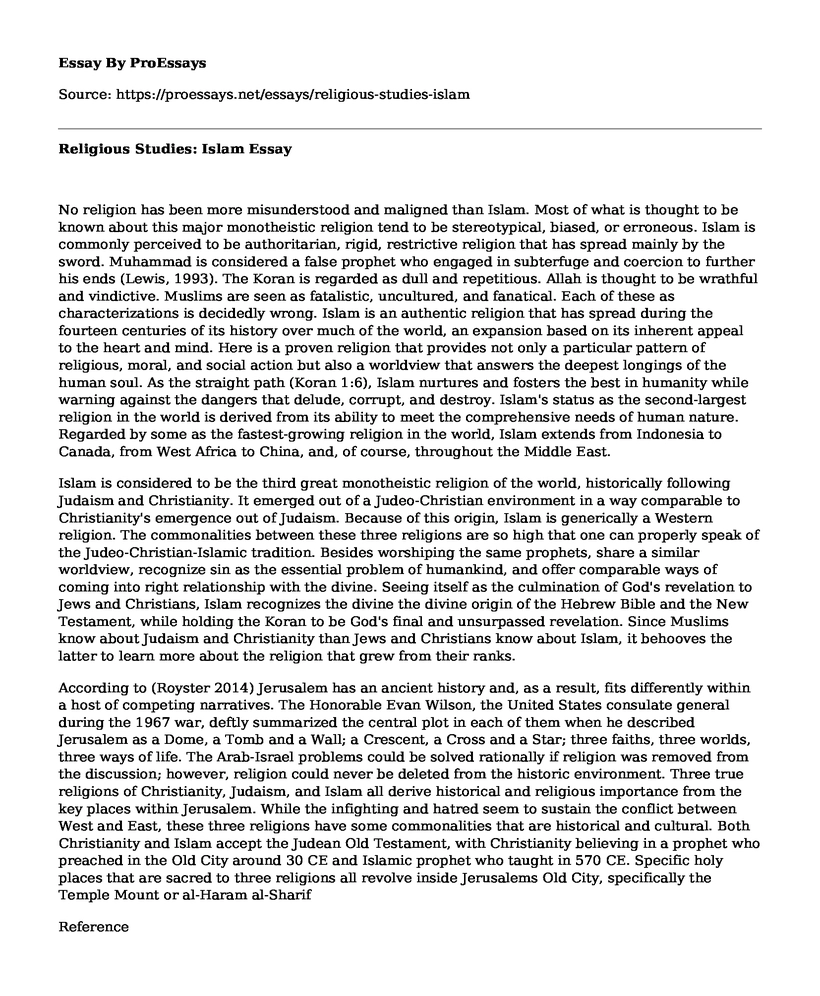No religion has been more misunderstood and maligned than Islam. Most of what is thought to be known about this major monotheistic religion tend to be stereotypical, biased, or erroneous. Islam is commonly perceived to be authoritarian, rigid, restrictive religion that has spread mainly by the sword. Muhammad is considered a false prophet who engaged in subterfuge and coercion to further his ends (Lewis, 1993). The Koran is regarded as dull and repetitious. Allah is thought to be wrathful and vindictive. Muslims are seen as fatalistic, uncultured, and fanatical. Each of these as characterizations is decidedly wrong. Islam is an authentic religion that has spread during the fourteen centuries of its history over much of the world, an expansion based on its inherent appeal to the heart and mind. Here is a proven religion that provides not only a particular pattern of religious, moral, and social action but also a worldview that answers the deepest longings of the human soul. As the straight path (Koran 1:6), Islam nurtures and fosters the best in humanity while warning against the dangers that delude, corrupt, and destroy. Islam's status as the second-largest religion in the world is derived from its ability to meet the comprehensive needs of human nature. Regarded by some as the fastest-growing religion in the world, Islam extends from Indonesia to Canada, from West Africa to China, and, of course, throughout the Middle East.
Islam is considered to be the third great monotheistic religion of the world, historically following Judaism and Christianity. It emerged out of a Judeo-Christian environment in a way comparable to Christianity's emergence out of Judaism. Because of this origin, Islam is generically a Western religion. The commonalities between these three religions are so high that one can properly speak of the Judeo-Christian-Islamic tradition. Besides worshiping the same prophets, share a similar worldview, recognize sin as the essential problem of humankind, and offer comparable ways of coming into right relationship with the divine. Seeing itself as the culmination of God's revelation to Jews and Christians, Islam recognizes the divine the divine origin of the Hebrew Bible and the New Testament, while holding the Koran to be God's final and unsurpassed revelation. Since Muslims know about Judaism and Christianity than Jews and Christians know about Islam, it behooves the latter to learn more about the religion that grew from their ranks.
According to (Royster 2014) Jerusalem has an ancient history and, as a result, fits differently within a host of competing narratives. The Honorable Evan Wilson, the United States consulate general during the 1967 war, deftly summarized the central plot in each of them when he described Jerusalem as a Dome, a Tomb and a Wall; a Crescent, a Cross and a Star; three faiths, three worlds, three ways of life. The Arab-Israel problems could be solved rationally if religion was removed from the discussion; however, religion could never be deleted from the historic environment. Three true religions of Christianity, Judaism, and Islam all derive historical and religious importance from the key places within Jerusalem. While the infighting and hatred seem to sustain the conflict between West and East, these three religions have some commonalities that are historical and cultural. Both Christianity and Islam accept the Judean Old Testament, with Christianity believing in a prophet who preached in the Old City around 30 CE and Islamic prophet who taught in 570 CE. Specific holy places that are sacred to three religions all revolve inside Jerusalems Old City, specifically the Temple Mount or al-Haram al-Sharif
Reference
Lewis, B., & Rogers D. Spotswood Collection. (1993). Islam and the West.Royster, J. E. (2014). Have this mind: Supreme happiness, ultimate realization, and the four great religions--an integral adventure.
Cite this page
Religious Studies: Islam. (2021, Mar 22). Retrieved from https://proessays.net/essays/religious-studies-islam
If you are the original author of this essay and no longer wish to have it published on the ProEssays website, please click below to request its removal:
- The Experience and Outcomes of Asians Americans Essay
- Essay Example on Exploring Religion and Spirituality: Reasons to Lead a Spiritual Life
- Family Influence on Socialization Essay Example
- Essay Sample on Christianity vs. Science: Exploring Nature from Different Perspectives
- Free Report Example on Ethical Dilemmas in Healthcare: Challenges and Solutions
- Free Essay Example: Structural versus Strategic Therapies
- History of Ethiopian Orthodoxy - Free Essay Sample







